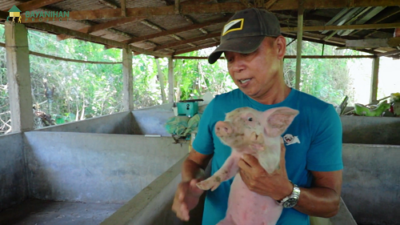Livelihood projects are an important focus of the Bayanihan Project, the flagship initiative of the Pure Incubation Foundation in the Philippines.
Life in the Philippines presents a unique contrast to life in the United States. The Philippines is an archipelago of over 7,640 islands and home to over 117 million Filipinos. It is a country prone to natural disasters, like typhoons, earthquakes, and volcanic eruptions. These types of emergencies are getting more destructive year after year, often wiping out entire communities.
The people of the Philippines tackle every challenge with unwavering determination, consistently showcasing their resilience and continually uplifting one another when faced with adversity. Despite their indomitable spirit, compassionate support for those in need remains strong.
It can be heart wrenching to see individuals and families in rural areas struggle with basic needs and daily survival. According to the World Health Organization (WHO), 26 million people in the Philippines live in abject poverty, and it worsened after the Covid19 pandemic. With limited access to education and viable work, a vicious cycle of poverty is at play.
Despite these grim realities, there is reason to be hopeful. By providing education, skills training, and opportunity through livelihood projects, we can help courageous Filipinos break free from this cycle and pave the way for a brighter future. The key, from our longstanding experience in this country, is to collaborate with local leaders to choose a project that meets the family and community needs and is sustainable. With careful planning and dedication, we can establish programs that will benefit them for years. This holistic approach offers a pathway from poverty toward a more sustainable, empowered future.
Livelihood Projects


Livelihood projects can take many forms and cater to diverse needs and situations. Some common examples include:
- Farming
- Food Carts
- Animal Agriculture
- Quilting/Sewing
Due to regional differences, livelihood projects often involve collaboration between government agencies, non-governmental organizations (NGOs), community-based organizations, and private sector partners. They aim to promote inclusive growth, social support, and sustainable development by addressing poverty, unemployment, and economic vulnerabilities at the individual, family, and community levels.
At the Pure Incubation Foundation, we work closely with local leaders and communities to craft solutions that work best for them. The community chooses each project in partnership with our unique network of local leaders. Livelihood projects are an important focus of the Bayanihan Project, and the story of Juanito Cortez is a powerful example of the impact.
Nego Bike Carts Drive Fresh Opportunities for Street Vendors

After a terrible house fire that destroyed his belongings, Juanito – a local street vendor – was left with nothing. His worry about how he would recover and sustain his family was unimaginable.
The Bayanihan Project, in partnership with a local police organization in their community, recognized the significant role street vendors play in the Philippine economy and their vulnerability to poverty. Their solution was to provide these vendors with negosyo or business carts, which they called Nego Bike Carts. Juanito feels hopeful that this opportunity will enable him to expand his small business and add more products to sell.
To learn more about this successful project, read here.
Benefits of Livelihood Projects

Charities like the Pure Incubation Foundation that work in communities to create livelihood projects can benefit individuals and society. Firstly, such collaborations empower community members by providing opportunities to develop sustainable skills and generate income. By offering vocational training, job placement services, or entrepreneurship support, charities enable individuals to become self-reliant and break free from the cycle of poverty.
Secondly, these projects foster community cohesion and resilience. They encourage collaboration, cooperation, and a sense of belonging among community members, as they work together towards a common goal. By involving the community in decision-making processes and project implementation, charities build trust and strengthen social ties.
Moreover, livelihood projects initiated by charities often have a positive ripple effect on the local economy. They can stimulate local production, promote small-scale businesses, and create employment opportunities. Combined, this improves the financial well-being of individuals and contributes to overall economic growth and development in the community.
Lastly, by addressing the specific needs and aspirations of the community, charities can create sustainable solutions that align with local cultures, traditions, and resources. This approach ensures long-term success and the continued engagement and ownership of the community in the projects, leading to lasting positive impacts.
How to Make Livelihood Projects Sustainable
Charities play a crucial role in making livelihood projects sustainable by implementing several key strategies:
1. Skills Training, Education, and Mentorship: This equips individuals with the knowledge and tools to manage and sustain the project.
2. Promote entrepreneurship: charities can promote income diversification by encouraging entrepreneurship and helping communities identify multiple sources of revenue. Diversification reduces reliance on a single income.
3. Facilitate Networking and Collaboration: fostering partnerships and knowledge-sharing that contribute to long-term success.
By integrating these approaches, charities can create sustainable livelihood projects and have a lasting positive impact on communities.




In addition, generating income through sales of project-produced goods can be a viable strategy for sustaining its operations. Sales create economic opportunities for the community and establish a reliable source of revenue to cover costs.
Thoughtfully coordinated and planned livelihood projects are an efficient way to support and empower people in the Philippines and beyond. By implementing these specific strategies, organizers can make a profound difference in the lives of the community they serve. The collaboration between charities and communities in creating livelihood projects has the potential to transform lives, strengthen social ties, boost the local economy, and break the chains of poverty for good.
To learn more about the Bayanihan Project and our impact, please visit www.bayanihanproject.org. Pure Incubation Foundation is a 501c3 and all donations are tax-deductible in the United States.



